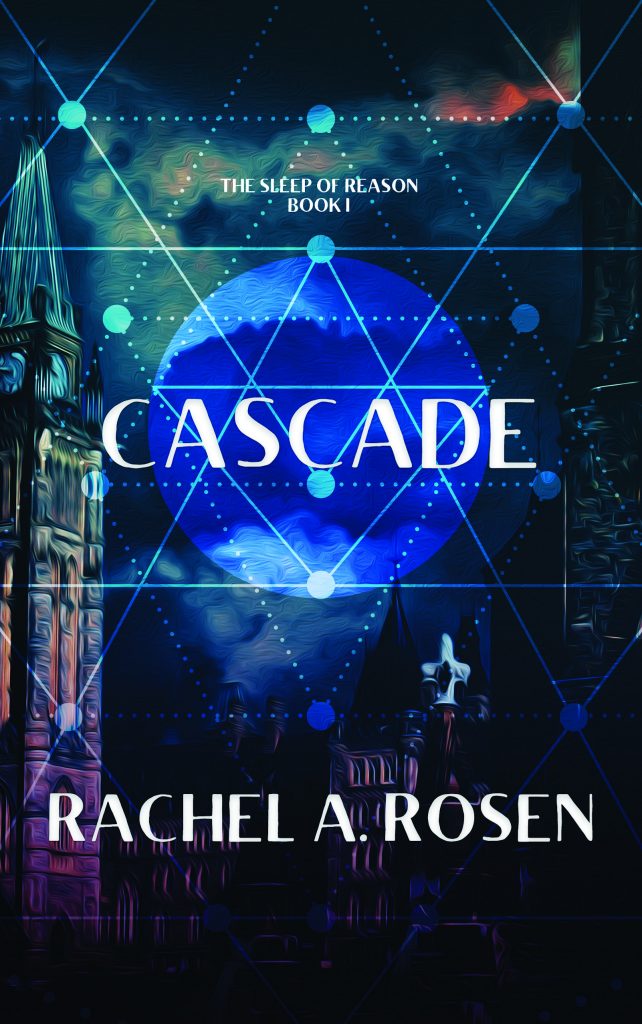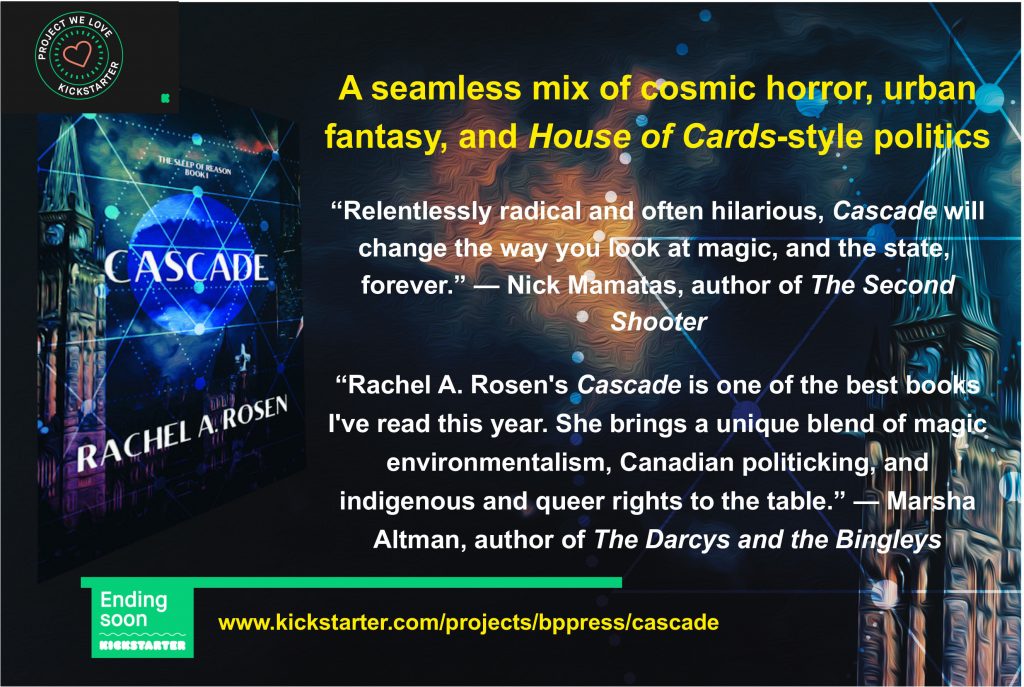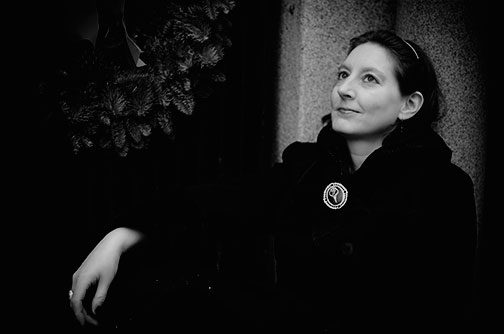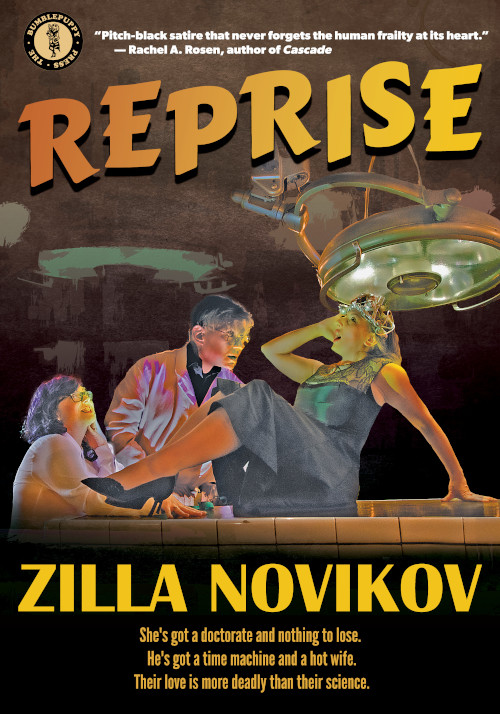Rachel A. Rosen on writing, and on having writ Cascade
This interview was originally published in the May 1, 2022 edition of the Night Beats Extended Universe monthly newsletter. The interview was conducted by Sabitha Furiosa and Zilla Novikov, who was recently signed by The BumbleBuppy Press. You can subscribe at https://nightbeatseu.ca/newsletter/.
The Kickstarter for Rachel A. Rosen’s debut novel, Cascade, outdid our wildest hopes—fully backed in 24 hours, and doubling the goal in less than a week. This month, we talk to Rachel about her book and her writing process.
Sabitha: What’s the novel about?
Rachel: Climate catastrophe. Institutional failure. Disaster wizards. Cascade is set a generation after the titular event, brought on by climate change, returned magic to the world—for better or worse, but mostly worse. A small number of people are able to channel magical energy, and one of them, Ian Mallory, works for the Canadian government, using his precognitive abilities to keep the ruling minority party in power. But when the disaster he predicts is much larger than the usual sordid affair, expense scandal, or minor terrorist incident that he’s hired to avert, it falls to the magic-loathing photojournalist Tobias, land rights activist Jonah, climate scientist Blythe, and Ian’s emoji-spell wielding intern Sujay, to prevent a future cataclysm bigger than politics or ideology.

Zilla: I adore Sujay and her relateable millennial lifestyle. What was the inspiration for writing her?
Rachel: Writers, particularly in genre fiction, are often advised to make their characters relatable, which I think is a laudable goal. My problem is that in much of the genre fiction that I read, “relatable” seems to translate to a blank-slate generic character. I keep encountering protagonists whose primary purpose is to serve as a wish-fulfilment stand-in for the reader. I prefer characters who are relatable because they seem like specific, real humans who you might bump into on the bus. I had this image of a girl in her bedroom, scrolling through emoji spells on Tumblr, and surprising herself when it turned out that they worked. She’s at least in part inspired by some of my students in my early days of teaching, who loved nerd culture and seldom saw, at least in North American fiction, a main character who looked like them or came from the kind of places where they lived.
Sujay is in many ways my love letter to Scarborough, an area in Toronto where I worked for years. Much of it, including the neighbourhood where Sujay is from, is an urban planning and architectural afterthought, car-centric, underfunded, and ill-served by municipal infrastructure. And yet beyond that surface appearance, it’s absolutely remarkable: culturally diverse, artistically vibrant, and politically engaged. Sujay’s character is inspired by her neighbourhood and the people I knew there. She’s an awkward, insecure mess, ill-suited to power and politics, and beneath the surface, positively brimming with magic.
Sabitha: The risk of writing political stories is that you can be overtaken by events. Did the election of Trump or the convoy in Ottawa change your writing?
Rachel: [laughter, followed by a lengthy episode of sobbing]. I absolutely had a crisis when the Ottawa convoy happened. I mean, so did the entire country, but my crisis was very personal and self-centred as for about a month there, I was convinced that the novel that I’d spent years writing was going to be made irrelevant by real-life events. Nor was I consoled when someone reminded me that Charles Stross—whose books very much influenced Cascade— had to scrap a plotline under similar circumstances.
I started the first scribblings that became Cascade around 2015, and there was actually a line in the original draft about the US electing a reality TV star as president and, well, we saw how that worked out. It’s always a risk. I don’t write fast enough to keep up with the creeping tide of global fascism, as it turns out. And outside of satire or comedy, you couldn’t get away with writing a villain as one-dimensionally evil and stupid as, say, Trump or Putin. It would just seem cartoonish. And yet.
My only defence against reality overtaking fiction is to keep inserting incredibly bonkers elements into the plot. I suppose if Lovecraftian horrors ever do start to awaken in the Pacific Ocean, I’ll have bigger problems than worrying that my novel is outdated.
Zilla: In many ways, Ian carries the heart of the story, but you choose not to make him a POV character in Cascade. Why did you go with that?
Rachel: The main reason is entirely pragmatic. He’s precognitive. He knows the ending of the story from before the first chapter, so having him as a POV character and knowing his motivations would make it far less of a surprise for the reader. From the outset I wanted to make him an enigma that the reader comes to know through how other characters view him.
And he takes up a lot of space. Left to his own devices, he would take over the whole story the way he takes over the country before the novel begins.
That said, his POV is incredibly fun to write, and I’ve written a short story where we get to see it. (You can get your hands on it through the Kickstarter.)
Sabitha: The labyrinth is such a cool way to cast magic, and something I don’t think I’ve seen in fiction before. What does the labyrinth mean to you?
Rachel: The entire magic system formed organically, where the story needed it. Aesthetically, I wanted a magic system that was rooted in the mundane. There are no wands or crystal balls in the Sleep of Reason universe. There are cell phones, fidget spinners, and spreadsheets that channel the feral magic of the world. Ian’s magic focus was drawing, and he needed something to draw. The labyrinth was a symbol that appeared a few times in my life—I had a friend years ago who was a street artist and would spray paint them in the middle of roads or build them out of stone, and at one point I used a meditation labyrinth to get back into writing when I was going through a rough patch—so that became one of the facets through which magic gets revealed.
Zilla: This story could have been told as a political thriller or political satire. What drew you to write it as fantasy?
Rachel: Cascade actually did start out as a near-future political thriller, and it resisted being written as such until I relented and let it have wizards in it. As I said before, I write too slowly for my commentary on specific political events to be relevant, and a fantasy element allows for a degree of separation, particularly in magic realism where social commentary is expected to be oblique.
But I also just love fantasy as a genre, even if it’s a prickly, combative sort of love. Speculative fiction offers a space for imaginative possibilities that realistic settings cannot. Political thrillers and satire can identify social ills and perhaps suggest solutions, but they don’t allow for the transformation of the world as we know it. Sleep of Reason explores grim territory—colonialism, climate catastrophe, fascism—but it contains within it the potential for a radical reimagining of our relationship with the world and each other.
There’s a joke right at the beginning about how magic is necessary for Ian’s vision of politics to be realized. Perhaps the most fantastical element of Cascade is a well-meaning, socialist-leaning government actually getting elected in Canada. But this is why I write fiction and not policy documents.
Sabitha: There are a lot of writers in our audience. Do you have any advice on telling stories?
Rachel: Get yourself a community of other writers. That’s it, that’s my big piece of advice.
Most of us, at least in western countries, have this toxic notion of storytelling as an individual pursuit, the lone creative genius weaving stories out of their imagination. I tried this myself and stalled out numerous times before I started writing with other people either in the room or online. Having communities to encourage, commiserate, vent, criticize, brainstorm, and crowdsource ideas not just keeps me motivated but also adds depth and authenticity to my work. The Night Beats News’ slogan is “it takes a village to write a novel,” and Cascade absolutely took a village to write. If I’d known this one cool trick when I started out, I’d have a bookshelf full of work by now.
Publisher’s note: There is still time to support the Cascade Kickstarter. Click the link below to learn more.




